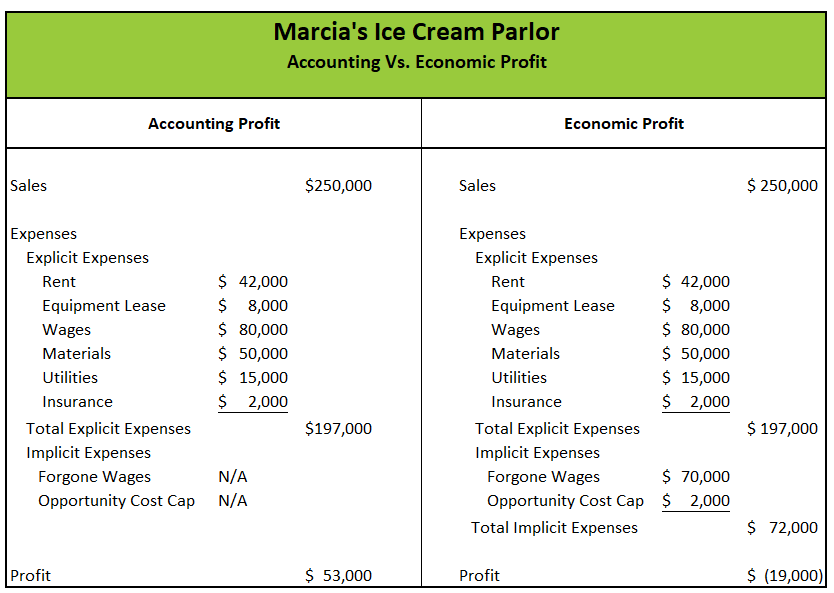Economic Profit
View FREE Lessons!
Definition of Economic Profit:
An
economic profit is the total revenue of a company, minus its explicit costs and implicit costs. Unlike an accounting profit, an economic profit includes opportunity costs.
Detailed Explanation:
A company’s profits can be calculated in two ways. The accountant is interested in the accounting profit, while the economist will look at the economic profit. The difference between an accounting profit and an economic profit is that the implicit costs are excluded from the accounting profit. Implicit costs do not require the outlay of money but are the value of a foregone opportunity. Implicit costs are opportunity costs. Economists believe businesses and individuals weigh their options when making economic decisions. Some value needs to be placed on the benefits given up. These are implicit costs and occur when an investment in time or money prevents a business from pursuing another opportunity. Accounting profits include only explicit costs, which are easily identified business expenses requiring money to be spent. Examples of explicit costs include, but are not limited to, rent, plant and equipment, wages, raw materials, utilities, and insurance. In general, the difference between total revenues (sales) and total explicit costs equals the accounting profit.
For example, Marcia is a computer programmer earning $70,000 per year. She has always wanted to run her own business and is considering opening an ice cream parlor. Marcia expects sales of $250,000 a year and projects explicit costs of $197,000. Her explicit expenses include rent, labor, raw materials, insurance, and utilities, so Marcia's accounting profit would be $53,000. Should Marcia start her business? Her business would be profitable. Economists would say, "No" because Marcia should consider what she would give up. These are her implicit or opportunity costs. One cost is her $70,000 salary. (Marcia would work full time and need to quit her current job.) Assume that Marcia must invest $100,000 to start her business. She would give up the opportunity to invest $100,000 in another investment such as a CD (Certificate of Deposit). Assume the CD earns $2,000 in interest annually. Another implicit cost is $2,000, the interest income she would give up if she opens her ice cream parlor. Marcia's economic profit is projected to equal a loss of $19,000, which is her accounting profit less the implicit expenses of $72,000. Clearly, Marcia would be better off financially if she did not open Marcia's Ice Cream Parlor. The difference between her accounting profit and economic profit is summarized in the two profit and loss statements below.

The only difference between an economic and accounting profit is in the inclusion of implicit costs, so the accounting profit will always be greater than the economic profit. The economic loss does not mean Marcia is losing money, but it does mean she would be better off using her time and resources as a computer programmer. An interesting note is that if Marcia borrowed money to finance her business, the interest paid on the debt would be considered an explicit cost and would be included in both the accountant and economist’s profit and loss because interest is actually paid by the company.
Now assume that George is interested in opening an ice-cream parlor. George recently retired and would like to return to work. George and Marcia's accounting profits would be equal, but George's economic profit would be $51,000 assuming his only implicit cost is the interest income he would forgo when $100,000 is invested in his new business. This illustrates how two individuals owning the same business would have equal accounting profits, but different economic profits because of their different circumstances.
Frequently small business owners will say, “I am making a profit, but not enough money to justify remaining in business.” In these cases, the business owners would be earning an accounting profit, but they would have an economic loss because the accounting profit is not large enough to absorb the opportunity cost of another job and the other implicit costs.
Dig Deeper With These Free Lessons:
Opportunity Cost – The Cost of Every Decision
Entrepreneurs – Their Vital Role in The Economy
Changes in Supply – When Producer Costs Change
Market Structures I – Perfect Competition and Monopoly
